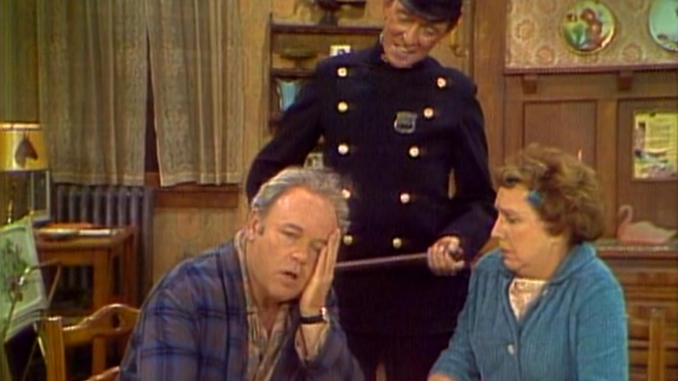
When All in the Family first hit the airwaves in 1971, it shattered the norms of television at the time. It was a sitcom, yes, but it was nothing like the family-friendly shows that dominated the landscape. No other show had tackled topics like racism, sexism, and the generational divides in American households with such boldness and unflinching honesty. In fact, All in the Family didn’t just entertain—it opened the door to a new kind of dialogue about the issues that matter most.
The show’s central character, Archie Bunker, portrayed by the incomparable Carroll O’Connor, became the embodiment of conservative America. Archie was unapologetic in his views—views that were often offensive, bigoted, and politically incorrect. Yet, instead of being portrayed as a villain, Archie was presented as a relatable, multi-dimensional character. This balance of comedy and critique sparked conversation across America, and it was exactly what creator Norman Lear intended.
By placing a character like Archie at the forefront, All in the Family challenged the way people thought about TV characters and societal issues. Archie’s constant clashes with his liberal son-in-law, Mike “Meathead” Stivic (Rob Reiner), became a hallmark of the show, serving as a microcosm of the broader cultural and political battles taking place in the 1970s. While the show made its audience laugh, it also forced them to confront uncomfortable truths about race, gender roles, class, and American identity.
One of the defining elements of All in the Family was its ability to use humor to disarm the viewer. When Archie made a racist or sexist remark, the laugh track might play, but the discomfort lingered. This technique made viewers question the values and prejudices that had previously been left unchallenged in sitcoms. And while Archie was a bigot, the show didn’t let him off the hook. His views were continually challenged by his family members, especially by his daughter, Gloria (Sally Struthers), and her husband, Mike. This generational divide highlighted the cultural shift happening in America during the civil rights movement and the feminist movement.
What made All in the Family even more groundbreaking was that it wasn’t just about political views—it was about the human experience. The show made viewers think about family dynamics, the role of women, and the complexities of social change. Edith Bunker (Jean Stapleton), Archie’s long-suffering wife, was a character who defied expectations. In a world where women were often portrayed as either the perfect homemaker or the rebellious feminist, Edith was neither. She was a woman with depth, compassion, and a voice that quietly, but powerfully, stood up for what was right.
The success of All in the Family was undeniable, and its impact continues to be felt today. It paved the way for other groundbreaking shows like Maude, Good Times, and The Jeffersons, all of which were also created by Norman Lear. The sitcom format had been transformed, and it was no longer just about family-friendly humor—it was about using the platform to challenge the status quo and spark real conversations.
In addition to its social impact, All in the Family had an undeniable effect on the television industry itself. The show pushed boundaries in terms of what was acceptable for prime-time television. It tackled issues that had been previously seen as too taboo to discuss on TV, and it did so with humor and honesty. Today, we take for granted the way shows address social issues, but it was All in the Family that laid the groundwork for this kind of storytelling.
In conclusion, All in the Family wasn’t just a television show—it was a cultural landmark. It didn’t shy away from tough conversations, and it didn’t sanitize the world for viewers. It portrayed life as it was—messy, complicated, and full of contradictions—and in doing so, it changed television forever. For those who haven’t watched it yet, it’s time to go back and see the show that dared to ask the tough questions, and that’s still relevant today.
